Potamides archiaci
† Potamides archiaci is an extinct species of sea snail, marine gastropod molluscs in the family Potamididae.
| Potamides archiaci | |
|---|---|
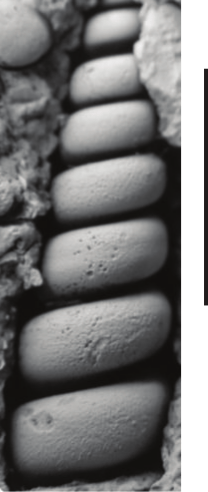 | |
| Abapertural view of holotype Potamides archiaci. Scale bar is 10 mm. | |
| Scientific classification | |
| Kingdom: | |
| Phylum: | |
| Class: | |
| (unranked): | |
| Superfamily: | |
| Family: | |
| Genus: | |
| Species: | † P. archiaci |
| Binomial name | |
| † Potamides archiaci Halder & Sinha, 2014[1] | |
The specific name archiaci is in honour of French paleontologist Adolphe d'Archiac, who was one of the pioneering researchers to describe molluscs from the Indian subcontinent.[1] Type specimen are deposited in the Department of Geology, Presidency University, Kolkata.[1]
Distribution
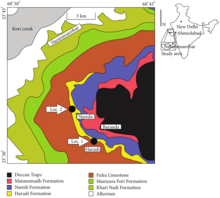
This species occurred in the lower Middle Eocene of Kutch District, Gujarat, western India.[1] The type locality is about 2 km north of village Harudi 23°32′00″N 68°40′52″E, Harudi Formation, lower Middle Eocene.[1]
Description
Potamides archiaci is placed to the genus Potamides according to its shape, coiling pattern, and typical ornamentation.[1]
The shell is small, narrow, turretedand conical. The spire is high. The shell is widening slowly. Apical angle is small. The shell has about 15 depressed whorls. whorls are separated by prominently impressed suture. The base of the shell flat. The aperture is elliptical. There are two prominent rows of spiral tubercles on the sculpture. Surface in earliest whorls is marked only by a beaded angularity. Posterior beads become stronger tubercles and more distantly spaced than the anterior beads.[1]
The width of the holotype is 5.9 mm. The reconstructed height of the holotype is about 24 mm. The maximum measured width of the shell is 8.05 mm. The maximum reconstructed shell height is 31.22 mm.[1]
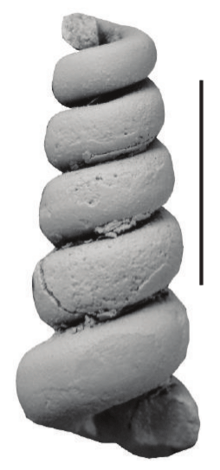 Photo of apertural view of paratype. It is the biggest shell of this species. Scale bar is 10 mm in all images. |
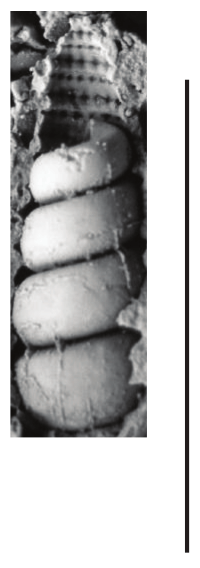 Abapertural view of paratype. Reconstructed shell width is 2.6 mm. Reconstructed shell height is 7.3 mm. |
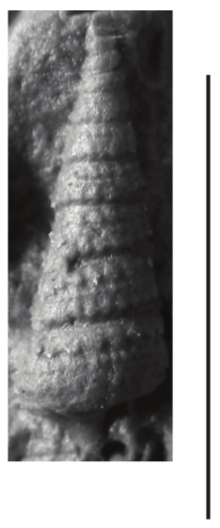 Abapertural view of paratype. Shell width is 3.77 mm. Shell height is 9.03 mm. |
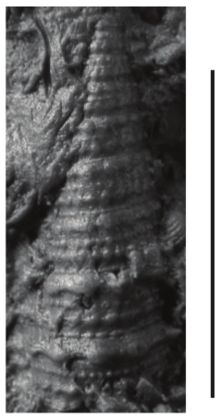 Abapertural view of paratype. Shell width is 6.48 mm. Shell height is 15.68 mm. |
 Abapertural view of paratype. Shell width is 3.35 mm. Reconstructed shell height is 7.57 mm. |
References
This article include CC-BY-3.0 text from the reference[1]
- Halder, K., & Sinha, P. (2014). "Some Eocene Cerithioids (Gastropoda, Mollusca) from Kutch, Western India, and Their Bearing on Palaeobiogeography of the Indian Subcontinent". Paleontology Journal, 2014, Article ID 673469, doi:10.1155/2014/673469.
External links
| Wikimedia Commons has media related to Potamides archiaci. |